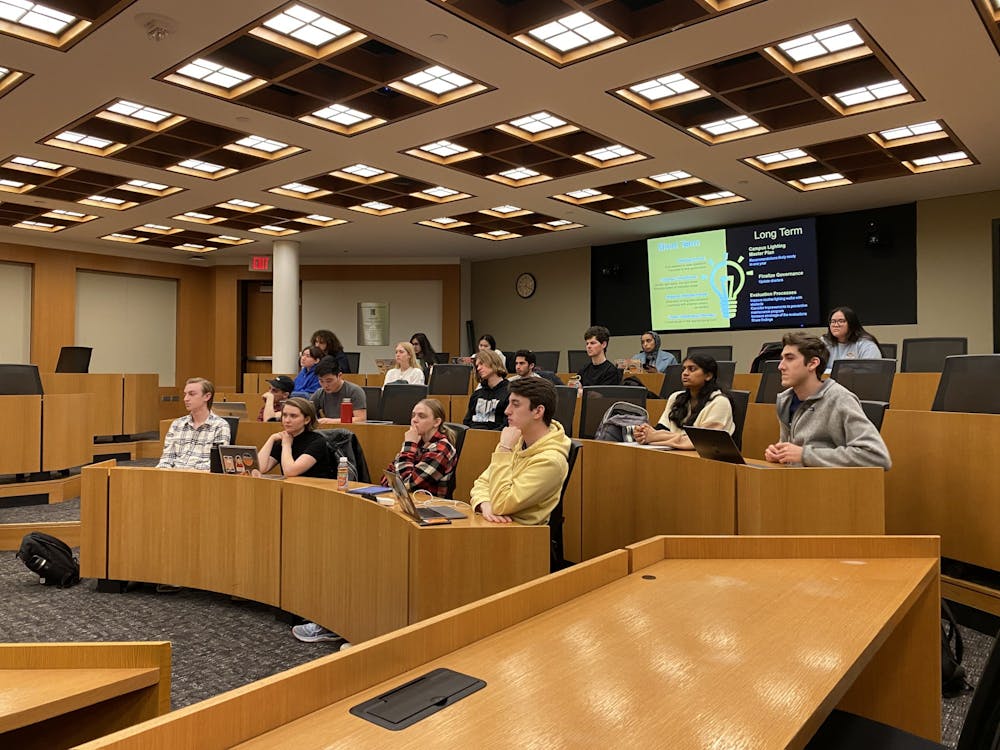Campus lighting governance is “complicated,” said Director of Campus Safety and Health Kelly States, given the high number of departments and units involved. States spoke on the University’s working group for improving campus lighting at the March 7 Undergraduate Student Government (USG) meeting, though offered few specifics on progress that has been made by the University.
States’s presentation was part of an ongoing conversation surrounding campus safety and security since the passing of Misrach Ewunetie ’24 on campus last October. In November, the University announced it would be tightening access to some residential buildings, expanding the existing security camera program, and enhancing campus lighting. Campus lighting and security cameras have both been a focus of discussion at USG.
In a November feedback session with the Department of Public Safety, students expressed a variety of perspectives on the proposed expansion of security cameras, from an additional sense of safety to concerns about privacy. However, increased lighting on campus has received much wider support.
States noted that the Office of Housing conducts annual safety walks to evaluate the condition of outdoor lighting on campus. She explained that these walks are “centered around residential areas” and focus on maintenance. However, in November, now-former USG President Mayu Takeuchi ’23 shared feedback that walks occur too early in the day, as there isn’t “the same feel on campus as at midnight.” States echoed the sentiment that the walks might be “too limited,” since they focus on areas in residential colleges.
“Just meeting the code requirement is not where we want to be as far as our philosophy [goes] about lighting and exterior lighting. So, we are looking to address some of those concerns as well,” States added.
She also emphasized that lighting is “a really complex issue,” adding, “it’s not always ‘more light is better.’” States explained that “more light can create darkness elsewhere or contrast the way the human eye actually reacts to light.”
The working group also has to account for “competing priorities” in the areas of research, sustainability, and light pollution. States also explained that the group has a “really good opportunity” to influence long-term decisions, given that the University campus lighting master plan is due for renewal.
“Nothing is set in stone,” said States in response to a question from Senator Noah Luch ’24, “but we’re starting to see more things like Lot 20, where we have motion-activated lights, and I think that’s probably a standard we’re heading to.”
Other subjects discussed at the meeting included the announcement of USG President Stephen Daniels ’24 that, given the upcoming departure of Deputy Dean of Undergraduate Students Thomas Dunne, Assistant Dean of Undergraduate Students Ian Deas would take over his role as USG advisor.
The USG also approved Projects Board spending for various events: artist visits hosted by the Princeton Ethiopian and Eritrean Student Association (PEESA), a Korean Students Association of Princeton (KSAP) welcome dinner for its new e-board, Princeton’s Partnership Minyan conference during an upcoming Shabbat, and the Muslim Student Association’s (MSA) annual fast-a-thon during Ramadan. Student groups only need to present Projects Board requests to USG when the request exceeds $1000. All spending was approved in a unanimous vote.
The meeting ended with a general discussion of scooters and bike usage on campus, focusing on accessibility issues, bike registration, and University capacity for bikes and scooters. Princeton recently announced that students would have to register their scooters starting in the fall.
USG meetings are held every Sunday at 4 p.m. in Robertson 001 and are open for all students to attend.

Nandini Krishnan is a News contributor for the ‘Prince.’
Please send any corrections to corrections[at]dailyprincetonian.com.








